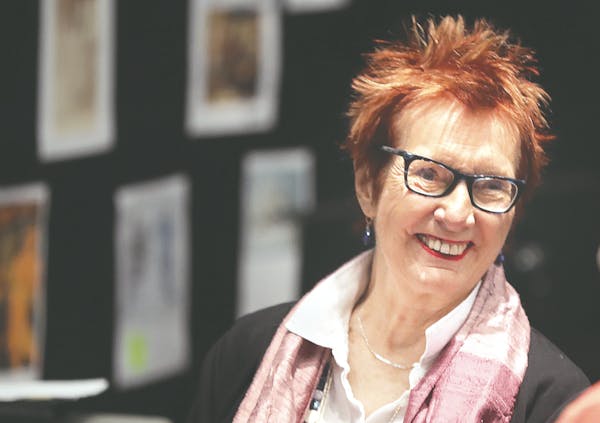A mother kills her kids. A father feasts on his son. Brothers battle to the death. The stories that we read about or see on the news may cause us to exclaim unconsciously or leave us numb. But as a new play that premieres and closes this weekend at the Guthrie Theater shows us, such horrors have been going on from time immemorial. And the messengers are not to blame.
The movingly poetic show, "Bad News! I Was There," opened in Minneapolis on Saturday at 5:30 a.m., a liminal time when both the receding darkness and the advancing light are at an equilibrium. And, in its way, "Bad News" has a rough balance; the heavy content of the show is leavened by magisterial artistry, including powerful acting and gorgeous music.
Conceived and directed by theater auteur JoAnne Akalaitis, best known for her landmark 1989 Guthrie production of "The Screens," the show has a team of stellar collaborators. (Tony winner Jennifer Tipton did the lights and inventive composer Bruce Odland composed the haunting melodies.)
"Bad News" offers a heavy menu of items to take in at any time of the day, but especially before breakfast.
In curating this work, Akalaitis has excerpted classic stories, including of Medea, who kills her children; Oedipus, who murders his father and marries his mother; and Thyestes, who feasts on his sons. There's also Hecuba, who begs for death over enslavement and Orestes, who kills his mother.
It's not a stroll around the lake by any stretch.
But the show, which has monologues delivered in Greek, is not elegiac or mournful. To the contrary. "Bad News" is engaging and occasionally invigorating. Akalaitis has inventively directed it as a processional that takes place in the public spaces of the Guthrie. The action starts just outside the box office, where the company of eight principal actors, including Emily Gunyou-Halaas, Nathaniel Fuller, Ann Michels and Stephen Yoakam, deliver the prologue with wit and affecting honesty.
Then, in four color-coded clusters, the audience follows guides — supplementary actor-singers who bear what we may consider postmodern lanterns (clear bags with portable lights) — to four stations upstairs on the fourth floor of the theater.
To a person, the principal actors — JuCoby Johnson, Cynthia Jones-Taylor, Eric Sharp and Megan Burns round out the roster — deliver command performances. When Burns and Johnson say together, "It's a sad story; I saw it with my own eyes," there's a choral honesty that makes them credible.
In the open lobby, the stories bleed into one another. The mixture of voices shows that the audience and the storytellers are part of a bigger world — and history. The show is suffused with incantatory, multi-harmony singing, music that's both gorgeous and functional. The songs that swell up and fill the theater sound like things you might hear in a temple, even as they are cues for the guides to take the audience from station to station.
The harmonies repeat, the themes rebound, and through the poetry of the classics we are reminded of the power of storytelling. We are witnesses to each other's triumphs and tragedies and to history. As the messenger actors delivered, we took in "Bad News" as if it was something essential. The show is a reminder that each of us, even in dire circumstances, possesses a modicum of grace and light.
rpreston@startribune.com • 612-673-4390

Syl Jones, provocative opinion writer and pioneer in narrative medicine, dies at 72
Minneapolis' Cameron Wright is shining on season 26 of 'The Voice'

Review: Grumpiest 'Grinch' yet barrels through the audience at Children's Theatre

At 50, Guthrie's 'Christmas Carol' hits the mark. Die-hard fans cherish it as a family tradition.


